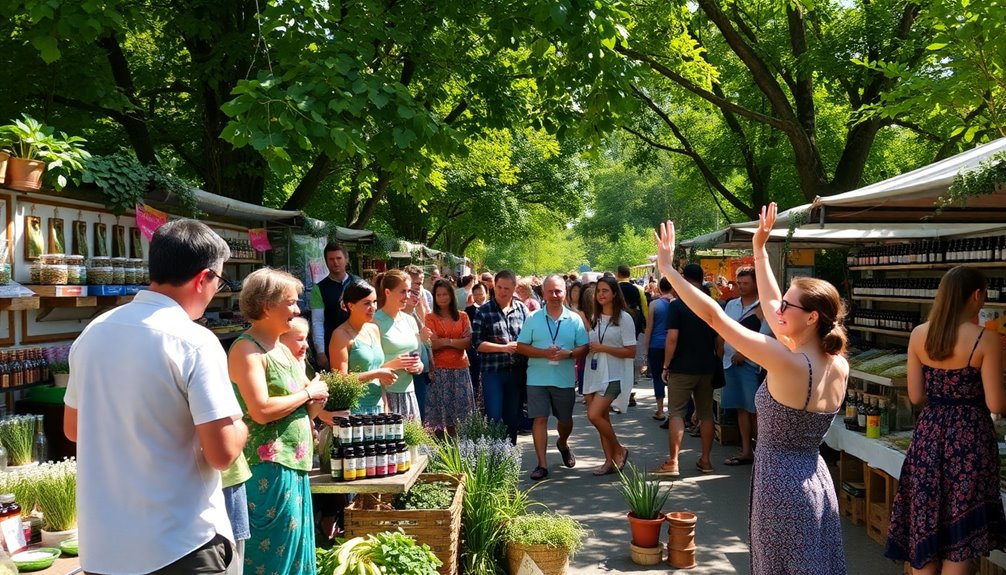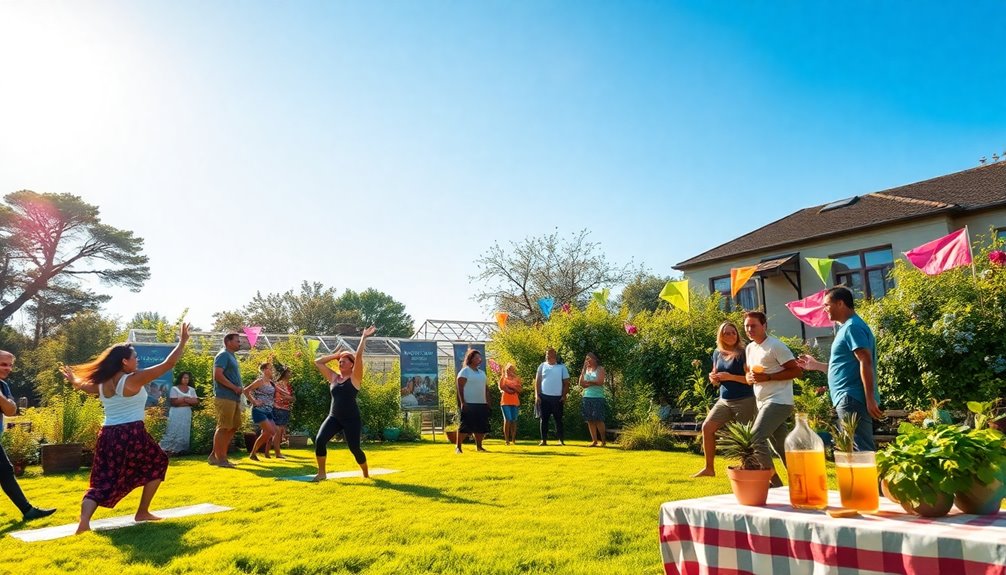Public interest in holistic health evolved as people sought extensive approaches that consider mind, body, and spirit. The late 20th century played a vital role, with dissatisfaction in conventional medicine driving exploration of alternative therapies like yoga and acupuncture. Movements emphasizing personal growth and emotional well-being gained momentum, highlighting the importance of community support and engagement. As you explore further, you'll discover more about the rich history and practices surrounding holistic health.
Key Takeaways
- The questioning of conventional medicine in the late 20th century sparked renewed interest in holistic health practices.
- The Human Potential Movement emphasized personal growth and mental well-being, influencing public awareness of holistic approaches.
- Increased adoption of alternative practices like yoga and meditation highlighted the importance of the mind-body connection in health.
- Traditional healing methods, such as Ayurveda and Traditional Chinese Medicine, gained popularity for their comprehensive views on wellness.
- The rise of internet and social media facilitated discussions around holistic health, normalizing its practices and expanding public interest.
Overview of Holistic Health and Its Importance

Holistic health is all about treating the whole person—mind, body, and spirit. This approach focuses on underlying causes of illness, rather than just symptoms, leading to better overall health.
By emphasizing prevention and self-care, you're encouraged to take an active role in your well-being. This interconnectedness highlights how mental and emotional health can affect your physical state.
Lifestyle factors like diet, exercise, and stress management play essential roles in achieving holistic wellness. As concerns about chronic diseases and mental health rise, understanding the importance of holistic health becomes critical.
Adopting this thorough perspective can empower you to make healthier choices, ultimately fostering a balanced and fulfilling life. Prioritizing holistic health can transform your everyday experience.
Evolution of Public Interest in Holistic Health

You've likely noticed how public interest in holistic health has transformed over the decades.
Historical roots in holistic practices and cultural shifts towards personal well-being have sparked a growing embrace of alternative therapies.
As more people seek integrative approaches, understanding these influences can help you navigate your own health journey.
Historical Roots of Holism
As people began to question the limitations of conventional medicine, the late 20th century witnessed a resurgence of interest in holistic health.
The Human Potential Movement and Self-Help Movement sparked a shift toward personal growth, emphasizing mental and emotional well-being. You might've noticed how this fostered public interest in holistic health approaches, encouraging individuals to explore alternative health practices.
Traditional Chinese Medicine and Ayurveda gained traction by highlighting the connection between physical, mental, and spiritual health, providing a more balanced view of wellness.
As consumer awareness about health grew, dissatisfaction with conventional treatments led many to seek natural therapies. The exploration of carrier oils for dilution in essential oils became a popular area of interest among those pursuing holistic health.
The rise of the internet and social media further facilitated access to information, normalizing discussions around holistic health in everyday life.
Cultural Shifts in Health
With the growing emphasis on personal well-being, a cultural shift towards holistic health has emerged, reflecting broader societal changes in how we approach health and wellness.
This shift stems from an increased interest in personal growth and self-care, driven by dissatisfaction with traditional medicine's limitations.
You've likely noticed the rise of alternative approaches—like yoga and meditation—highlighting the mind-body connection.
The Human Potential Movement and humanistic psychology have fueled this trend, promoting empowerment and self-discovery.
Additionally, the internet and social media have enhanced public awareness, making holistic health practices more accessible.
As society values proactive health management, holistic health is becoming mainstream, embodying a collective desire for personalized care and well-being. Cultural intelligence (CQ) is essential for success in modern health environments, as it fosters better understanding and communication across diverse populations.
Influence of Alternative Practices
While many people have turned to alternative practices in recent decades, their influence on the evolution of public interest in holistic health can't be overstated.
As dissatisfaction with conventional medicine grew, you began exploring options like yoga, acupuncture, and meditation. These practices highlighted the mind-body connection and promoted personal responsibility in managing your health.
The Human Potential Movement further empowered you, emphasizing mental and emotional health alongside physical well-being.
Increasing awareness of stress's impact on health led many to seek holistic approaches that address root causes rather than just symptoms. Aromatherapy's ability to reduce cortisol levels has gained popularity as a natural method to alleviate stress and anxiety.
Additionally, the internet and social media fostered community support, making alternative practices more accessible and driving the growing interest in holistic health.
Ancient Remedies and Traditional Medicine

Ancient remedies and traditional medicine offer profound insights into health that many modern practices often overlook.
Ancient civilizations, like those in India and China, embraced holistic approaches such as Ayurveda and Traditional Chinese Medicine (TCM). Ayurveda, originating in the 6th century B.C., emphasizes individualized care through diet, herbal medicine, and meditation, promoting overall wellness.
TCM, with roots nearly 5,000 years ago, utilizes acupuncture and dietary therapy to restore balance, focusing on concepts like qi and yin-yang.
Additionally, Native American healing traditions stress spiritual connections to nature and community, integrating herbal remedies into their health and wellness practices.
Rise of Natural and Alternative Therapies

As dissatisfaction with conventional medicine grows, more people are turning to natural and alternative therapies to manage their health.
These therapies, including acupuncture, chiropractic care, and massage, focus on restoring balance and promoting overall wellness. You might find that these complementary options resonate with your needs, especially as you seek personalized care that aligns with your values.
The rising interest in holistic health underscores the importance of proactive health management, allowing you to take control of your well-being. Many are discovering that natural therapies can enhance emotional well-being and provide effective solutions without the side effects often associated with traditional treatments. Additionally, essential oils like eucalyptus oil are gaining popularity for their therapeutic benefits, offering relief for various ailments.
Mind-Body Connection

The mind-body connection is an essential aspect of holistic health, illustrating how your mental and emotional states can profoundly impact your physical well-being.
Research in psychoneuroimmunology highlights that stress and emotional well-being directly affect your immune function and overall health.
By practicing techniques like yoga and meditation, you can reduce stress and enhance both mental and physical health, fostering a strong mind-body connection.
The Self-Help Movement popularized the idea of personal responsibility for mental health, leading to increased awareness of holistic practices that integrate mind and body.
Today, holistic health education emphasizes the interconnectedness of mental, emotional, and physical well-being, advocating for thorough approaches that treat the whole person rather than just isolated symptoms. Mindfulness techniques can also serve as effective tools to strengthen this connection by promoting relaxation and focus.
Holistic Approaches to Nutrition

Holistic nutrition emphasizes bio-individuality, recognizing that your preferences and requirements greatly influence dietary choices and health outcomes. By focusing on whole foods, you prioritize nutrient-rich options that support ideal health and foster a healthy lifestyle. Organic foods, free from harmful chemicals, further enhance your well-being while promoting environmental sustainability. Additionally, holistic nutrition connects mental, emotional, and spiritual health through mindful eating practices, encouraging you to cultivate a positive relationship with food. Recent studies show that adopting these principles can lead to improved health outcomes, including better weight management and reduced inflammation, ultimately enhancing your mental well-being and overall quality of life. Incorporating essential oils can also complement holistic nutrition by providing natural health benefits and enhancing overall wellness.
Community Engagement and Support Networks

When you engage with your community in holistic health, you create supportive spaces that foster collective well-being. Participating in group wellness activities, like yoga or workshops, not only enhances your health but strengthens community ties. Additionally, embracing vibrational alignment can significantly elevate the collective energy and positivity within these community practices.
Collective Health Initiatives
Collective health initiatives have emerged as powerful tools for fostering community engagement and support networks, encouraging individuals to come together around shared health goals.
These initiatives, rooted in holistic health movements, promote collaboration among local organizations and create opportunities for participants to connect. Workshops and seminars focused on holistic health practices offer educational resources for self-improvement and raise awareness about various health issues.
By organizing health activities, these initiatives strengthen community ties and enhance collective well-being efforts. Furthermore, community support networks have normalized discussions around holistic health, driving public interest and increasing participation in alternative health practices.
Additionally, these initiatives often incorporate elements of the Law of Attraction, emphasizing the importance of positive thinking in achieving health goals.
Ultimately, these collective health initiatives empower individuals while creating a supportive environment for everyone involved.
Supportive Community Spaces
Supportive community spaces play an essential role in enhancing collective health efforts by fostering engagement and connection among individuals.
These environments promote holistic well-being through networking and education, creating platforms for sharing health experiences. Workshops and seminars on holistic health not only provide valuable resources but also raise awareness about various health practices.
As you participate in these initiatives, you'll find that community support normalizes alternative health discussions, making it easier to explore new approaches to wellness.
Connecting with like-minded individuals in these spaces enriches your journey toward self-improvement and encourages collective efforts in promoting health.
Group Wellness Activities
How can group wellness activities transform your health journey? By participating in these activities, you engage in holistic health practices that strengthen community engagement.
Whether it's yoga, meditation, or wellness workshops, these settings foster social connections, allowing you to share experiences and support one another. This sense of belonging is essential for your mental and emotional health, enhancing your overall well-being.
Support networks often organize events like health fairs and group exercises, boosting public awareness of holistic health.
Plus, with the rise of virtual wellness communities, you can join group activities from anywhere, breaking geographical barriers.
Embrace group wellness activities to cultivate a supportive environment that nurtures your health journey and enriches your life.
Frequently Asked Questions
How Did the Public Interest in Holistic Health Evolve?
You might notice that public interest in holistic health has surged over the years, driven by a growing awareness of alternative therapies like yoga and acupuncture.
As you explore these practices, you'll see how individuals seek natural solutions for well-being.
The rise of the internet has made information more accessible, allowing you to connect with others and learn about the mind-body connection, which further fuels your desire for a balanced, healthy lifestyle.
How Did Public Interest in Holistic Health Evolve Question 14 Options?
When you explore how public interest in holistic health evolved, consider key factors like dissatisfaction with conventional medicine, the rise of movements promoting personal health responsibility, and the internet's role in spreading information.
You'll see the growing emphasis on natural solutions and preventive care. As people became more aware of the mind-body connection, they sought out holistic approaches, ultimately shaping a more integrated view of health and wellness in society.
What Is the Holistic Approach to Public Health?
Imagine a garden where each plant thrives, nourished by sunlight, water, and rich soil; that's the holistic approach to public health.
It recognizes that your well-being connects physical, mental, and social aspects. Instead of just treating illness, it empowers you to embrace preventive care and lifestyle choices.
What Is the Origin of Holistic Health?
The origin of holistic health traces back thousands of years, with practices like Traditional Chinese Medicine and Ayurveda emphasizing balance and interconnectedness.
You'll find that Hippocrates, the "Father of Medicine," advocated for natural healing methods, laying foundational ideas for holistic approaches.
These ancient philosophies recognize the importance of treating the whole person—body, mind, and spirit—rather than just the symptoms, which is a key principle that still resonates in today's wellness practices.
Conclusion
So, as you sip your kale smoothie and meditate on your chakras, remember that holistic health didn't just pop up because we got tired of doctors. It evolved from ancient remedies, a sprinkle of desperation, and a dash of social media hype. Who needs scientific studies when you've got a wellness influencer promising eternal vibrancy? Embrace the trend, but don't forget: sometimes, a little skepticism is the best herb in your holistic garden.









